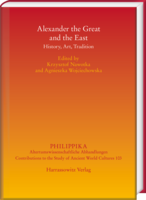|
weitere Titel zum Thema:
Download:
Bitte beachten Sie: Mit digitalen Produkten in Ihrem Warenkorb
wird die Bezahlung nur per PayPal möglich. Der Download dieser Produkte wird bereitgestellt, wenn die Bezahlung bestätigt ist. Even if Alexander’s rule in Asia has to be approached primarily through the study of Greek and Latin authors, many papers in this volume try to look beyond Arrian, Plutarch, Curtius, and Diodorus to Greek inscriptions, papyri, Egyptian, Babylonian, medieval Syriac and Arabic evidence. One focus is on Egypt, from the XXX dynasty to the Ptolemaic age. A lasting achievement of the early Macedonian age in Egypt is the lighthouse of Pharos, probably devised under Alexander to serve both as a watchtower of Alexandria and the focal point of the fire telegraph. Another focus of the volume is on Babylonia, with caveats against the over-enthusiastic usage of cuneiform sources for Alexander. This focus then moves further east, showing how much caution is necessary in studying the topography of Alexander’s campaigns in Baktria, the land often misrepresented by ancient and medieval authors. It also deals with representation and literary topoi, having in mind that Alexander was as much a historical as a literary figure. In many respects ancient Alexander historians handled his persona in strong connection with Herodotean topics, while the idealized portrait of Alexander translated, through court poetry, into the language of power of Ptolemy of Egypt. Alexander was adopted to cultural traditions of the East, both through the medium of the Alexander Romance and through his fictitious correspondence with Aristotle, sometimes becoming a figure of a (Muslim) mystic or a chosen (Jewish) king.
|
|||||||||||||||||||||||||||||||||||||||||






